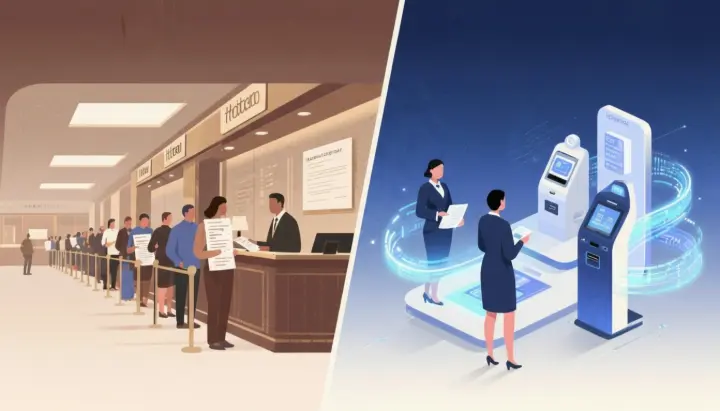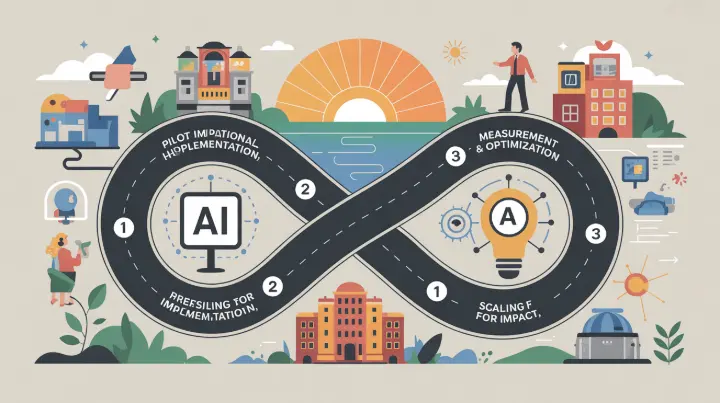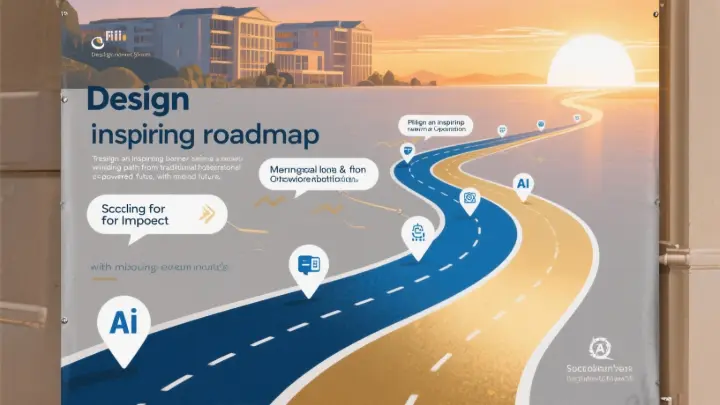The hospitality industry is experiencing a revolutionary shift with the emergence of agentic AI SaaS platforms. These autonomous, intelligent software-as-a-service systems go far beyond traditional chatbots, acting proactively and completing complex tasks on behalf of users without constant human oversight. Unlike reactive customer service tools of the past, agentic AI can independently handle bookings, manage appointments, and engage in sophisticated conversations that drive real business outcomes.
The demand for such intelligent automation in hospitality has never been higher. Properties are seeking AI agents that can seamlessly handle reservations, appointment scheduling, and conversational service with minimal human intervention. This shift is already showing impressive results, with Airbnb's AI support agent reducing live-agent interactions by 15%, demonstrating the tangible impact these systems can deliver.
The Dawn of Truly Intelligent Hospitality Technology
Agentic AI SaaS represents a fundamental departure from traditional hospitality technology solutions. While conventional chatbots simply respond to predetermined prompts, agentic AI systems are proactive, adaptive, and capable of making independent decisions across entire workflows. These systems learn from interactions, anticipate guest needs, and execute complex multi-step processes without human intervention.

Key Characteristics of Agentic AI Systems:
- Autonomous Decision-Making: These systems can analyze complex scenarios and make informed decisions without waiting for human approval, such as automatically upgrading guests based on availability and loyalty status.
- Learning and Adaptation: Unlike static rule-based systems, agentic AI continuously improves through machine learning, adapting to guest preferences and seasonal patterns.
- Multi-Step Workflow Execution: Can handle complex processes like coordinating room changes, billing adjustments, and service requests across multiple departments simultaneously.
- Contextual Understanding: Maintains conversation context across multiple interactions, remembering guest preferences and previous conversations for personalized service delivery.
The software-as-a-service delivery model makes this sophisticated technology accessible to properties of all sizes. Delivered through the cloud, agentic AI SaaS enables scalable deployment across multiple properties with minimal infrastructure burden, allowing even boutique hotels to leverage enterprise-level AI capabilities.
SaaS Implementation Benefits:
- Rapid Deployment: No need for extensive on-premise infrastructure or lengthy installation processes
- Automatic Updates: Continuous improvements and new features deployed seamlessly across all properties
- Scalable Architecture: Systems that grow with business needs without requiring hardware investments
- Predictable Costs: Subscription-based pricing models that align costs with usage and value delivery
Transforming Guest Interactions Across Every Touchpoint
Beyond streamlining bookings, agentic AI SaaS transformation in hospitality is reshaping how hotels interact with guests at every stage of their journey.
From the moment a traveler considers a stay to long after check-out, AI agents ensure every touchpoint feels seamless, personal, and responsive.
Conversational Booking Intelligence
Modern agentic AI booking assistants engage guests in natural language conversations across websites, messaging apps, and social media platforms. These systems understand context, handle complex requests, and guide guests through the entire booking process with human-like intelligence.
Advanced Booking Capabilities:
- Natural Language Processing: Guests can say "I need a room for my anniversary next weekend with a view" and the AI understands intent, dates, and preferences
- Dynamic Pricing Integration: Real-time rate optimization based on demand, seasonality, and guest profile
- Upselling Intelligence: Contextual recommendations for room upgrades, packages, and add-on services based on guest behavior and preferences
- Multi-Platform Consistency: Seamless experience whether guests book through website, mobile app, or social media messaging
HiJiffy's AI booking assistant exemplifies this evolution, enabling guests to book directly through conversational interfaces while the system dynamically presents availability and pricing in real-time. The result is a frictionless booking experience that feels personal yet operates at scale.

Conversion Optimization Features:
- Abandoned Booking Recovery: Automatically follows up with guests who started but didn't complete bookings
- Preference Learning: Remembers guest choices to streamline future interactions
- Payment Integration: Secure, conversational payment processing that feels natural within the chat flow
24/7 Restaurant and Service Coordination
Restaurants and hospitality venues are deploying AI hosts that manage reservations, answer dietary inquiries, and handle general questions around the clock. These systems never sleep, never take breaks, and consistently deliver exceptional service quality.
Restaurant AI Host Capabilities:
- Dietary Accommodation Management: Instantly provides detailed ingredient information and suggests menu modifications for allergies and preferences
- Table Optimization: Intelligently manages seating arrangements to maximize capacity while considering guest preferences
- Wait Time Management: Provides accurate wait estimates and offers alternative timing or location suggestions
- Special Occasion Recognition: Identifies celebrations and automatically suggests appropriate packages or amenities
AI hosts like Jasmine are already operating in restaurants across major cities, managing bookings and guest inquiries 24/7 while maintaining the warmth and personality guests expect from hospitality interactions.
Service Coordination Features:
- Cross-Venue Communication: Coordinates between multiple restaurant locations for seamless guest experiences
- Staff Notification Systems: Alerts appropriate team members about special requests or VIP arrivals
- Inventory-Aware Recommendations: Suggests dishes and beverages based on real-time availability
Intelligent Concierge and Planning Services
Advanced agentic AI systems function as virtual concierges, building personalized itineraries and contextually upselling services based on guest preferences and behavior patterns. These agents understand guest intent and can orchestrate complex travel arrangements autonomously.
Personalized Planning Capabilities:
- Behavioral Analysis: Studies guest interaction patterns to predict preferences and suggest relevant experiences
- Local Integration: Maintains updated databases of local attractions, events, and services for informed recommendations
- Dynamic Itinerary Building: Creates and adjusts schedules based on weather, availability, and guest feedback
- Cross-Service Coordination: Integrates transportation, dining, and activity bookings into cohesive experiences
Expedia's "Romie" demonstrates this capability by independently rebooking flights during disruptions and managing itinerary changes without human intervention, ensuring guests experience minimal inconvenience during travel complications.
Proactive Service Features:
- Disruption Management: Automatically handles flight delays, cancellations, and other travel disruptions
- Preference Tracking: Maintains detailed guest profiles across multiple stays and interactions
- Surprise and Delight: Identifies opportunities for unexpected positive experiences based on guest behavior
Driving Measurable Revenue Growth and Operational Excellence
Agentic AI SaaS is no longer limited to answering a few questions on a hotel website. Today’s AI agents can engage guests before, during, and after their stay creating a seamless experience across every channel.
- Pre-arrival: Proactive agents confirm bookings, recommend room upgrades, and even schedule spa or restaurant reservations before guests arrive.
- During stay: In-room AI concierges handle requests instantly, from extra towels to late checkout, without the need to call the front desk.
- Post-stay: Automated follow-ups request feedback, suggest loyalty offers, and encourage repeat bookings through personalized messages.
By bridging these touchpoints, agentic AI SaaS transformation in hospitality doesn’t just improve convenience it builds long-term relationships that uplift both revenue and customer satisfaction.

Direct Booking Revenue Acceleration
The revenue impact of agentic AI SaaS in hospitality is both immediate and substantial. Properties implementing these systems see dramatic improvements in direct bookings and operational efficiency.
Revenue Generation Mechanisms:
- Commission Savings: Reduces dependence on third-party booking platforms by driving direct reservations
- Dynamic Upselling: AI identifies optimal moments and methods for presenting upgrades and add-on services
- Conversion Rate Optimization: Personalized booking experiences that significantly improve completion rates
- Repeat Business Cultivation: Automated follow-up and relationship building that encourages return visits
Lake District Hotels achieved a 70% reduction in incoming calls while simultaneously boosting direct room bookings through HiJiffy's conversational booking solution. This dual benefit of cost reduction and revenue increase exemplifies the transformative potential of agentic AI.
HotelPlanner's AI agents generated £150,000 in bookings within their first month of deployment, with the company projecting business growth to £2.4 billion as they scale their AI-driven approach.
Performance Metrics:
- Average Order Value: AI-driven upselling increases transaction values by suggesting relevant add-ons
- Booking Velocity: Faster booking processes lead to higher conversion rates and reduced abandonment
- Customer Lifetime Value: Enhanced experiences and personalization drive repeat bookings and loyalty
Operational Transformation and Cost Optimization
Beyond revenue generation, agentic AI delivers profound operational improvements that directly impact profitability. These systems automate routine tasks while enabling staff to focus on high-value guest interactions and strategic initiatives.
Cost Reduction Areas:
- Labor Optimization: Reduces need for 24/7 human coverage while maintaining service quality
- Error Minimization: Automated processes reduce booking errors, double bookings, and miscommunications
- Training Cost Reduction: Consistent AI performance eliminates ongoing training needs for routine inquiries
- Operational Efficiency: Streamlined workflows reduce administrative overhead and processing time
PortoBay Hotels, utilizing HiJiffy's platform, automated 80% of guest queries while simultaneously enabling pre-check-in upselling opportunities. This automation freed staff to focus on personalized service delivery while the AI handled routine inquiries and transactions.
Wyndham Hotels achieved remarkable efficiency gains by implementing AI agents for franchisee support, reducing process time by an astounding 94%. This dramatic improvement in operational efficiency demonstrates how agentic AI can transform back-office operations alongside guest-facing services.
Efficiency Improvements:
- Response Time Optimization: Instant responses to guest inquiries regardless of time or staff availability
- Resource Allocation: Better utilization of human staff for high-value activities
- Quality Consistency: Standardized service delivery across all touchpoints and time periods
Expanding Horizons: The Future of Intelligent Hospitality
The next wave of agentic AI SaaS transformation in hospitality goes beyond booking engines and chat assistants.
Hotels and resorts are starting to imagine AI as a strategic partner that orchestrates entire guest journeys.
- Hyper-personalization: AI agents will remember guest preferences across multiple visits favorite meals, pillow types, or even activity styles and adjust services automatically.
- Revenue optimization: Intelligent pricing models will use real-time demand, events, and even weather data to recommend optimal rates and packages.
- Cross-property orchestration: Large hotel groups will leverage AI to synchronize loyalty programs, marketing campaigns, and guest experiences across multiple locations.
- Sustainability intelligence: AI-driven energy management and smart resource allocation will align with eco-conscious traveler demands.
This evolution shifts AI from being a supporting tool to becoming the central nervous system of hospitality where every touchpoint, from marketing to housekeeping, is guided by proactive, self-improving AI agents.
Proactive Crisis Management
Agentic AI systems are evolving to handle complex disruption scenarios autonomously. These intelligent agents can rebook flights, arrange alternative accommodations, offer appropriate compensation, and maintain continuous guest communication during travel disruptions, all without human intervention.
Crisis Response Capabilities:
- Real-Time Monitoring: Continuously scans for potential disruptions affecting guest travel plans
- Alternative Solution Generation: Quickly identifies and presents multiple options for resolving travel issues
- Compensation Calculation: Automatically determines appropriate compensation based on disruption severity and guest profile
- Multi-Channel Communication: Keeps guests informed across all communication channels with consistent messaging
This proactive approach transforms potential negative experiences into demonstrations of exceptional service, turning crisis moments into opportunities for guest loyalty building.
Service Recovery Features:
- Emotional Intelligence: Recognizes guest stress levels and adjusts communication tone accordingly
- Predictive Problem Solving: Anticipates potential issues before they affect guest experiences
- Continuous Updates: Maintains real-time communication with affected guests throughout resolution process
Orchestrating Seamless Operations
The scope of agentic AI extends far beyond guest interactions into comprehensive operational orchestration. AI systems are now optimizing labor scheduling based on demand forecasting, local events, and weather patterns, ensuring optimal staffing levels while controlling costs.

Operational Intelligence:
- Demand Forecasting: Analyzes historical data, events, and market conditions to predict occupancy and service needs
- Staff Optimization: Balances labor costs with service quality by intelligently scheduling team members
- Supply Chain Coordination: Manages inventory levels and vendor relationships based on predicted demand
- Energy Management: Optimizes utility usage based on occupancy patterns and guest preferences
Smart housekeeping coordination represents another breakthrough application, with AI systems dynamically adjusting cleaning schedules based on real-time departures, occupancy patterns, and guest preferences. This intelligent coordination maximizes room availability while maintaining exceptional cleanliness standards.
Housekeeping Intelligence:
- Real-Time Schedule Adjustment: Adapts cleaning schedules based on actual check-outs and arrivals
- Priority Ranking: Identifies which rooms need immediate attention based on incoming bookings
- Staff Coordination: Optimally assigns housekeeping tasks based on staff skills and location
- Quality Monitoring: Tracks cleaning completion and quality standards across all rooms
Revenue Intelligence and Optimization
Advanced agentic AI platforms integrate dynamic pricing algorithms, real-time inventory allocation, and personalized promotion engines to maximize revenue per available room. These systems continuously analyze market conditions, competitor pricing, and guest behavior to optimize pricing strategies in real-time.
Revenue Management Features:
- Competitive Intelligence: Monitors competitor pricing and adjusts rates for optimal market positioning
- Demand Sensing: Identifies booking patterns and adjusts availability and pricing accordingly
- Personalized Pricing: Offers customized rates based on guest loyalty, booking history, and preferences
- Package Optimization: Creates and promotes bundled offers that maximize total guest spend
Market Analysis Capabilities:
- Local Event Integration: Adjusts pricing and availability based on concerts, conferences, and local attractions
- Weather Correlation: Factors weather patterns into demand forecasting and pricing strategies
- Seasonal Pattern Recognition: Leverages historical data to optimize long-term pricing strategies
Emerging Capabilities and Market Evolution
The next generation of agentic AI brings emotional intelligence capabilities, seamless multi-channel touchpoint management, and ambient in-room AI personalization. These advances promise even deeper guest engagement and operational sophistication.

Emotional Intelligence Features:
- Sentiment Analysis: Recognizes guest emotions through text and voice interactions
- Adaptive Communication: Adjusts tone and approach based on guest mood and preferences
- Empathy Modeling: Responds appropriately to guest concerns with genuine understanding
- Stress Detection: Identifies when guests are experiencing difficulties and escalates appropriately
Multi-Channel Integration:
- Unified Guest Profiles: Maintains consistent guest information across all interaction channels
- Seamless Handoffs: Transfers conversations between channels without losing context
- Omnichannel Analytics: Tracks guest journey across all touchpoints for comprehensive insights
While Gartner predicts that governance challenges may delay some large-scale deployments, targeted pilot programs continue demonstrating strong ROI and guest satisfaction improvements, paving the way for broader adoption.
Navigating Implementation Challenges
While the promise of agentic AI SaaS transformation in hospitality is compelling, hoteliers must navigate practical challenges to ensure smooth adoption and long-term success.
Technical Integration Complexity
Implementing truly effective agentic AI requires sophisticated integration across property management systems, customer relationship management platforms, booking engines, and numerous other operational systems. Many hospitality properties operate on fragmented legacy technology stacks that require careful integration planning.
Integration Considerations:
- API Compatibility: Ensuring new AI systems can communicate effectively with existing software
- Data Migration: Safely transferring historical guest and operational data to AI platforms
- System Dependencies: Managing interdependencies between AI systems and critical operational tools
- Performance Impact: Monitoring how AI integration affects existing system performance
Technical Architecture Requirements:
- Scalable Infrastructure: Cloud-based systems that can handle peak demand periods
- Real-Time Processing: Low-latency systems that respond immediately to guest interactions
- Redundancy and Backup: Fail-safe systems that maintain operations during technical issues
- Security Protocols: Robust cybersecurity measures protecting guest data and operational systems
Data Governance and Security
Successful agentic AI deployment demands robust data quality, security protocols, and privacy protection measures. Properties must establish comprehensive governance frameworks that ensure ethical AI use while maintaining guest trust and regulatory compliance.
Data Management Requirements:
- Quality Assurance: Ensuring data accuracy and completeness for optimal AI performance
- Privacy Compliance: Meeting GDPR, CCPA, and other regulatory requirements for guest data protection
- Access Controls: Implementing role-based permissions for AI system access and data usage
- Audit Trails: Maintaining comprehensive logs of AI decisions and data access for accountability
Security Implementation:
- Encryption Standards: End-to-end encryption for all guest data and communications
- Authentication Protocols: Multi-factor authentication for AI system access and management
- Regular Security Audits: Ongoing assessment of system vulnerabilities and security effectiveness
- Incident Response: Clear procedures for handling data breaches or security incidents
Building Human-AI Collaboration
Effective agentic AI implementation requires defining appropriate guardrails and maintaining human oversight for high-risk decisions. Staff training becomes crucial as teams learn to work alongside AI systems and trust their recommendations while maintaining ultimate accountability for guest experiences.
Collaboration Framework Development:
- Decision Boundaries: Clear guidelines on when AI can act autonomously versus when human approval is required
- Escalation Protocols: Defined processes for transferring complex issues from AI to human staff
- Performance Monitoring: Regular assessment of AI decision quality and impact on guest satisfaction
- Feedback Mechanisms: Systems for staff to provide input on AI performance and suggest improvements
Staff Training Programs:
- AI Literacy: Educating team members on how AI systems work and their capabilities
- Workflow Integration: Training staff on new processes that incorporate AI assistance
- Quality Assurance: Teaching staff to review and validate AI decisions appropriately
- Guest Communication: Preparing staff to explain AI capabilities and limitations to guests when necessary
Cultural Transformation Management
The integration of agentic AI represents a significant organizational change that requires thoughtful change management. Staff must be equipped to collaborate with AI systems effectively while understanding their evolving roles in an AI-augmented hospitality environment.
Change Management Strategies:
- Leadership Alignment: Ensuring management commitment to AI transformation and clear communication of benefits
- Role Redefinition: Helping staff understand how their roles evolve rather than being replaced by AI
- Resistance Management: Addressing concerns and skepticism through education and gradual implementation
- Success Celebration: Highlighting wins and positive outcomes to build momentum for broader adoption
Cultural Integration Approaches:
- Gradual Implementation: Phased rollouts that allow staff to adapt progressively to AI capabilities
- Feedback Culture: Creating environments where staff feel comfortable providing input on AI performance
- Continuous Learning: Ongoing education programs to keep staff current with AI capabilities and best practices
- Recognition Programs: Acknowledging staff members who successfully integrate AI into their workflows
Your Roadmap to Agentic AI Success
Adopting agentic AI SaaS in hospitality isn’t just about adding a new technology—it’s about designing a transformation strategy that balances innovation, measurable ROI, and guest-centric service. Here’s a roadmap to guide hoteliers and hospitality leaders through this journey.
Strategic Pilot Implementation
Begin your agentic AI journey with focused pilot programs targeting specific use cases like conversational booking or reservation management. Platforms like HiJiffy offer excellent entry points for testing AI agent capabilities with manageable scope and clear success metrics.
Pilot Program Design:
- Use Case Selection: Choose high-volume, routine interactions that offer clear ROI potential
- Success Criteria Definition: Establish measurable goals for automation rates, guest satisfaction, and cost savings
- Timeline Planning: Set realistic implementation schedules that allow for proper testing and refinement
- Team Selection: Identify champions and early adopters who can drive successful pilot execution
Implementation Steps:
- System Configuration: Customize AI agents to match brand voice and service standards
- Integration Testing: Thoroughly test connections with existing systems before guest-facing deployment
- Staff Training: Prepare team members to work alongside AI systems and handle escalations
- Soft Launch: Begin with limited guest groups to identify and resolve issues before full deployment

Measurement and Optimization
Establish comprehensive tracking for automation rates, customer satisfaction scores, direct booking lift, and return on investment. These metrics provide the foundation for demonstrating value and guiding expansion decisions.
Key Performance Indicators:
- Automation Rate: Percentage of inquiries handled completely by AI without human intervention
- Response Time: Average time from guest inquiry to AI response and resolution
- Guest Satisfaction: Ratings and feedback specifically related to AI interactions
- Conversion Rates: Booking completion rates for AI-assisted versus human-assisted interactions
- Cost per Interaction: Total cost savings achieved through AI automation
Analytics and Reporting:
- Real-Time Dashboards: Live monitoring of AI performance and guest interactions
- Trend Analysis: Identification of patterns in guest behavior and AI effectiveness
- Comparative Studies: Before-and-after analysis of key metrics following AI implementation
- ROI Calculation: Detailed financial analysis of costs versus benefits from AI deployment
Scaling for Maximum Impact
Once initial pilots prove their value, strategically expand into dynamic pricing optimization, comprehensive operational orchestration, and proactive disruption management. This phased approach ensures sustainable growth and minimizes implementation risks.
Expansion Strategies:
- Horizontal Scaling: Extending successful AI implementations across additional properties or locations
- Vertical Integration: Adding new AI capabilities to existing successful deployments
- Advanced Features: Implementing sophisticated capabilities like predictive analytics and proactive service
- Partner Integration: Connecting AI systems with external partners and service providers
Advanced Implementation Areas:
- Revenue Management: AI-driven pricing optimization across all services and amenities
- Operational Automation: Extending AI into housekeeping, maintenance, and back-office operations
- Guest Journey Optimization: Using AI to enhance every touchpoint from booking to post-stay follow-up
- Predictive Maintenance: AI systems that anticipate and prevent operational issues before they impact guests
Long-Term Strategic Considerations:
- Technology Roadmap: Planning for emerging AI capabilities and industry developments
- Competitive Advantage: Using AI to differentiate services and create unique guest experiences
- Partnership Opportunities: Collaborating with AI vendors and technology partners for enhanced capabilities
- Innovation Culture: Building organizational capabilities for ongoing AI adoption and optimization
The future of hospitality belongs to properties that embrace intelligent automation while maintaining the human touch that defines exceptional guest experiences. Agentic AI SaaS provides the perfect foundation for this transformation, delivering measurable revenue growth, operational excellence, and guest satisfaction improvements that position forward-thinking properties for long-term success in an increasingly competitive marketplace.
Future-Proofing Strategies:
- Continuous Learning: Staying current with AI developments and industry best practices
- Flexible Architecture: Implementing systems that can adapt to new technologies and capabilities
- Guest-Centric Focus: Ensuring all AI implementations enhance rather than replace human hospitality
- Strategic Vision: Developing long-term plans that position properties as hospitality innovation leaders